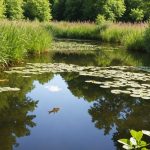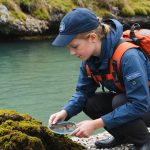Exploring Marine Conservation: Innovative Educational Programs for UK Children
The Importance of Marine Conservation Education
Marine conservation is a critical issue that affects not just the health of our oceans, but the entire planet. As the world grapples with climate change, plastic pollution, and the degradation of marine ecosystems, it is more important than ever to educate the next generation about the importance of protecting our oceans. In the UK, several innovative educational programs are making a significant impact by teaching children about marine conservation.
The UCL Ocean Health Challenge: A Comprehensive Learning Experience
One of the most engaging and comprehensive programs is the UCL Ocean Health Challenge. This national engineering design challenge is open to secondary school and college students aged 11-18 and is accredited by the British Science Association’s CREST Awards scheme.
Topic to read : Discovering Ethical Wildlife Encounters: A Guide to Nature Reserve Etiquette in the UK
Learning Outcomes
By participating in the Ocean Health Challenge, students gain a deep understanding of various key topics:
- Ocean Ecosystem Complexity: Students learn to discuss the complexity of the ocean ecosystem and its importance for the planet’s health.
- Plastics and Their Impact: They describe the key properties of plastics, their benefits, and how they enter the ocean, causing harm to the ecosystem.
- Waste Management: Students outline the role of waste and why it should be considered a starting point rather than an end point.
- Engineering Roles: They explain the characteristics and responsibilities of engineers and their role in tackling global problems.
- Planet-Centred Design: Students practice planet-centred design and apply the engineering design cycle to build and evaluate prototypes.
- Communication Skills: They plan and deliver pitches in the form of posters to effectively communicate their solutions.
How to Run the Challenge
The challenge is highly flexible and can be integrated into various subjects within the school curriculum. Here are some indicative ideas on how to run the challenge:
In parallel : Essential Fish Species for UK Ponds: Boosting Local Ecosystems and Biodiversity
-
Within a Subject: Teachers can incorporate the challenge into core subjects like Science, Design Technology, Citizenship, or English. For example, in Science lessons, students can focus on planet and nature-centred design, while in Design Technology, they can create physical prototypes alongside technical drawings.
-
Drop Down Day: The challenge can also be adapted to run as a whole-day activity for a year group or the entire school. Teachers can shorten or lengthen activities based on the most important aspects of each lesson.
Marine Conservation Organizations and Their Educational Initiatives
Several marine conservation organizations are also playing a crucial role in educating children about ocean health.
Marine Conservation Society (MCS)
The Marine Conservation Society, a UK-based environmental charity, is dedicated to protecting the oceans. They offer various resources and initiatives to educate children about marine conservation.
-
Ocean Literacy: MCS provides educational materials and activities that help children understand the importance of ocean literacy. This includes learning about marine life, coral reefs, and the impact of plastic pollution on the ocean.
-
Community Engagement: MCS encourages community involvement through membership programs and public events. For example, their General Election conversation pack helps individuals become ocean advocates during election seasons.
Scottish Association for Marine Science (SAMS)
SAMS, the UK’s oldest independent marine science organization, offers educational programs that focus on marine science and conservation.
-
Research and Education: SAMS delivers research, education, and enterprise programs aimed at promoting a sustainable marine environment. They provide campus tours, talks, and opportunities for students to meet with scientists and lecturers.
-
Ocean Science: SAMS scientists are involved in various research projects, including the Plankton Manifesto, which highlights the critical role of plankton in the ocean’s ecosystem. Such initiatives help in educating young people about the intricacies of ocean science.
Practical Insights and Actionable Advice for Educators
For educators looking to integrate marine conservation into their curriculum, here are some practical insights and actionable advice:
Integrating Marine Conservation into the Curriculum
- Cross-Curricular Approach: Incorporate marine conservation into various subjects such as biology, geography, and design technology. This holistic approach helps students understand the interconnectedness of marine issues.
- Biology: Explore the physical characteristics of oceans, marine ecosystems, and the impact of human activities on marine environments.
- Geography: Investigate environmental challenges such as plastic pollution and strategies for sustainable development and management of marine environments.
Using Real-World Examples
- Case Studies: Use real-world examples of marine conservation efforts, such as the work of the Deep Sea Conservation Coalition or the Ocean Conservancy, to illustrate the impact of human actions on the ocean.
- Deep Sea Conservation Coalition: This coalition works to reduce threats to deep-sea ecosystems and safeguard their health and resilience. Sharing their work can inspire students to take action.
Encouraging Community Involvement
- Volunteer Programs: Encourage students to participate in volunteer programs that focus on marine conservation. For example, the Marine Conservation Society offers various community engagement activities.
- Beach Cleanups: Organize beach cleanups or participate in local marine conservation events. This hands-on experience helps students understand the direct impact of their actions on the ocean.
Table: Comparing Educational Programs
| Program Name | Age Group | Key Learning Outcomes | Flexibility in Implementation | Recognition/Awards |
|---|---|---|---|---|
| UCL Ocean Health Challenge | 11-18 | Ocean ecosystem complexity, plastics impact, waste management, engineering roles, planet-centred design | Can be integrated into various subjects or run as a drop-down day | CREST Awards (Bronze, Silver, Gold) |
| Marine Conservation Society | All ages | Ocean literacy, marine life, coral reefs, plastic pollution | Offers educational materials and community engagement activities | Membership programs and public events |
| Scottish Association for Marine Science | All ages | Marine science, ocean health, plankton research | Campus tours, talks, and research projects | Research and education programs |
Quotes from Experts and Participants
-
“The Ocean Health Challenge is a fantastic way to inspire young people to think about the complex issues facing our oceans and to develop practical skills in engineering and design.” – UCL Engineering Team.
-
“Educating children about marine conservation is not just about teaching them facts; it’s about inspiring them to become the next generation of ocean stewards.” – Marine Conservation Society.
-
“By integrating marine conservation into our curriculum, we are not only teaching science and geography but also fostering a sense of responsibility and stewardship among our students.” – Teacher, UK Secondary School.
Educating children about marine conservation is a vital step towards protecting our oceans for future generations. Programs like the UCL Ocean Health Challenge, initiatives by the Marine Conservation Society, and the educational efforts of the Scottish Association for Marine Science are all contributing to a more informed and engaged young population.
By integrating these programs into school curricula, using real-world examples, and encouraging community involvement, educators can make a significant impact on how children perceive and interact with the ocean. As we move forward in this critical era of climate change and environmental degradation, it is imperative that we equip our children with the knowledge, skills, and passion to protect our blue planet.
Additional Resources for Educators
- CREST Awards: For more information on how to apply for CREST Awards and integrate them into your teaching, visit the British Science Association’s website.
- Marine Conservation Society Educational Materials: Access a range of educational resources, including lesson plans and activity sheets, from the MCS website.
- Scottish Association for Marine Science: Explore the various educational programs and research initiatives offered by SAMS.
By leveraging these resources and programs, we can ensure that the next generation is well-equipped to make a positive impact on the world’s oceans.











